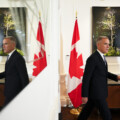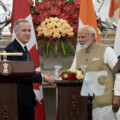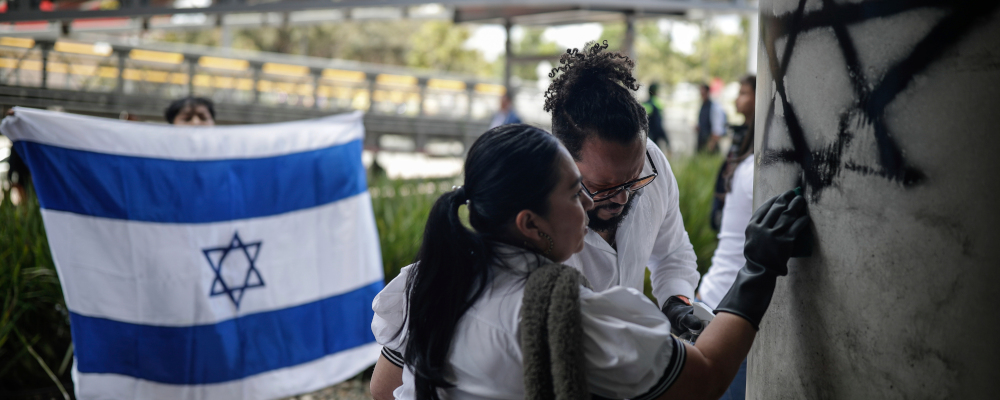On October 7, Gina Smiatich woke up to the sound of a red alert, a sound familiar to those who lived in Southern Israel. But this time something was different. The alerts kept coming, and then the message that there were intruders and for people to shelter in space.
Smiatich, a Czechoslovak-born Terezín camp survivor, was murdered in her living room by Hamas terrorists in Kibbutz Kissufim. After surviving the horrors of the Nazis, she was murdered decades later by the same hate—the hate that seeks the destruction of Jews.
We now have a better understanding of the brutal and systematic terrorist attacks carried out by Hamas through the South of Israel. The images and stories are horrific. That many Israelis—including more than a dozen children—are still being held hostage in Gaza means that this nightmare is far from over. The descriptions of women being raped so badly that their pelvises were broken or of children being tortured are so much worse than one could ever imagine.
Yet as awful as the news out of Israel has been, the scenes from our own countries have often made it worse. While many of us in the diaspora have loved ones in Israel, many of whom are now being called up for duty, we’re also looking at the world around us in our cities and witnessing support for these terrorist attacks and other forms of antisemitism from our fellow citizens. Only three weeks after these horrific attacks, it feels like the sympathy for those murdered, tortured, and kidnapped by Hamas has waned, opening the door for those who hate Jews to express it so freely under the guise of “anti-Zionism.”
It’s painfully clear that many people have lost their moral compass. It’s not just those who’ve hit the streets of Canadian cities over the three past weeks to essentially endorse Hamas and the attacks themselves. There’s something perverted for protestors to claim to be speaking for human rights while targeting Jewish community centres with schools in them or Jewish-owned businesses—to say nothing of ignoring the hostages still being held in Gaza.
There are also the academics, media figures, civil society leaders, and politicians who have used a combination of equivocation and pseudo-intellectualism to try to rationalize the mutilation of young women, the killing of babies and children, and the devastation of whole communities. Claims about “decolonization” or “context” or “balance” may sound clever for certain audiences, but they amount to what Globe and Mail columnist Andrew Coyne has rightly described as “moral confusion.”
This instinct to explain the attacks, withhold judgment, or actually blame the victims is not the norm for the country’s intellectual and political class. They’re usually happy to condemn and marginalize groups with whom they disagree. It’s not lost on me and other Canadian Jews that the same treatment isn’t extended when we’re the victims.
We’re also not blind to the realities of what is to come. Antisemitism has been on the rise globally including in Canada. The past three weeks have seen it pulled out from the shadows onto streets of the world’s major cities. There are some places—including Berlin—where Jews are being discouraged from making their faith visible for their own personal security. Stars of Davids have been drawn on the doors of Jewish homes elsewhere in Europe. In Poland, for instance, which is home to the graves of 3 million Jews murdered in the Holocaust, there are those marching with smiles on their faces condoning the murder of another generation of Jews.
It prompts the question: what will it take for these people to recognize the threat posed by antisemitism?
If they think that the ethos of white supremacists, here in Canada and elsewhere, and that of Hamas are any different, then they’re either not paying attention or are willfully blind. Article 7 of the Hamas charter calls for the genocide of Jews—not Israelis, but Jews.
The first step of moral clarity is to see the world as it is rather than through various “lenses.” It should have never gotten to a point where the Israeli government is forced to release horrific videos from the attacks to prove what happened.

What other country would have to release videos of their citizens burnt alive in order to prove that they aren’t lying? What other country would have to release videos of bloody children’s bedrooms or children’s body bags in order to show the world the atrocities that it’s describing are in fact real?
That many among us have failed this basic test of moral clarity has been revealing. We see you.
We see you: so-called feminist activists who can’t bring themselves to condemn rape. We see you: President of CUPE Ontario who has been silent on the murder of children and instead stood with those who call for our destruction. We see you: journalists who can’t utter the word “terrorists” and the politicians calling for “restraint and calm.” We see you: academics who rely on warped theories to rationalize and defend terrorist acts. And we see you: politicians who equivocate in the face of true evil.
Antisemitism is not something that exists as an abstract thought that went away after the Holocaust. Instead, it has become normalized and often even excused because of Israel.
When the Nazis marched into Czechoslovakia in 1938, Gina Smiatich and her family never could have imagined what was to come, that no country would take them in, and that the Nazis would be free to carry out their Final Solution for the Jewish people. For many diaspora Jews, for me especially as the grandchild of a Holocaust survivor, our love affair with Israel is about more than just our homeland; it’s our safety net. In the wake of October 7, as we struggle to mourn our dead while grappling with the reality that there are those on our own streets that hate us, that safety feels shattered and we are left wondering which of our neighbours could justify the murder of our families and which ones would hide us if they needed to.
Recommended for You

Mark Carney retracting support for Trump’s war in Iran could reveal rift in Liberal government: A timeline breakdown

‘A mix of emotions’: Why Iranian-Canadians are now holding their collective breath

‘This is a mess’: Why is Mark Carney flip-flopping on the Iran war?

Carney courting India and China reflects Canada’s shrinking good options in Trump era, David Frum explains



